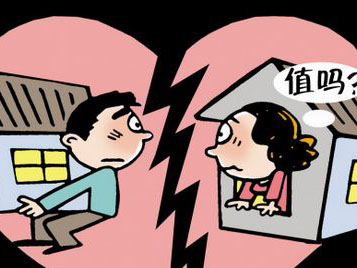Housing rules drive up fake divorces

 0 Comment(s)
0 Comment(s) Print
Print E-mail CNTV, November 2, 2013
E-mail CNTV, November 2, 2013
The divorce rate in China’s capital has soared by a staggering 41 percent since last year. Does that mean a sudden rise in unhappy families, or is something else driving up the divorce rate? At least some people in the cities are faking their divorces over housing.
Beijing residents Xiao Hui and Xiao Ming, who only spoke to us on the condition of anonymity, divorced each other to buy a second apartment.
"With the new government policy, if I didn’t fake a divorce, I would have to pay double the down payment, which I couldn’t afford. And I would have to pay 10 percent higher interest rates. I saved 200 thousand yuan on that. That’s two years' income for us! And I only bought a small 50-square-meter apartment," Xiao Hui said.
They remarried after the purchase. "We didn’t tell our parents. And our friends warned us to remarry quickly. We had a friend who fake divorced but one of them refused to get married again," Xiao Hui said.
The government has issued a series of regulations to cool down the overheating housing market. A couple must pay a higher down payment and interest rates to buy a second apartment. And under a clause issued in March, sellers are taxed 20 percent of the sale price.
The capital gains tax can amount to tens of thousands of dollars in first-tier cities. But a couple with two properties can divorce and put each apartment under one person’s name and then sell them tax-free.
We can never know how many couples have faked a divorce for the purpose of housing, of course those who will never publicly admit that. But what we know is that across the country, this is really happening. And analysts are connecting this to rising divorce rates.
In the first three quarters of this year, the divorce rate rose by 41 percent in Beijing, and 40 percent in Shanghai. The sudden rise came just after the new capital gain tax clause. Both cities have also had a significant rise of housing prices.
"To control housing prices, we increased taxes and fees for sales. Objectively, that can curb speculation. But high fees will disrupt the distribution of housing resources.
There is also a negative social effect: it is driving up divorce rates," said Niu Fengrui, former director of City Development and Environment Department at the Chinese Academy of Social Sciences.
Experts say that instead of making policies to control housing prices, which is against free market and has proved a failure in the past decade, the government should make more housing available to meet the city’s needs. Then couples wouldn’t need to risk their marriage for an apartment.





